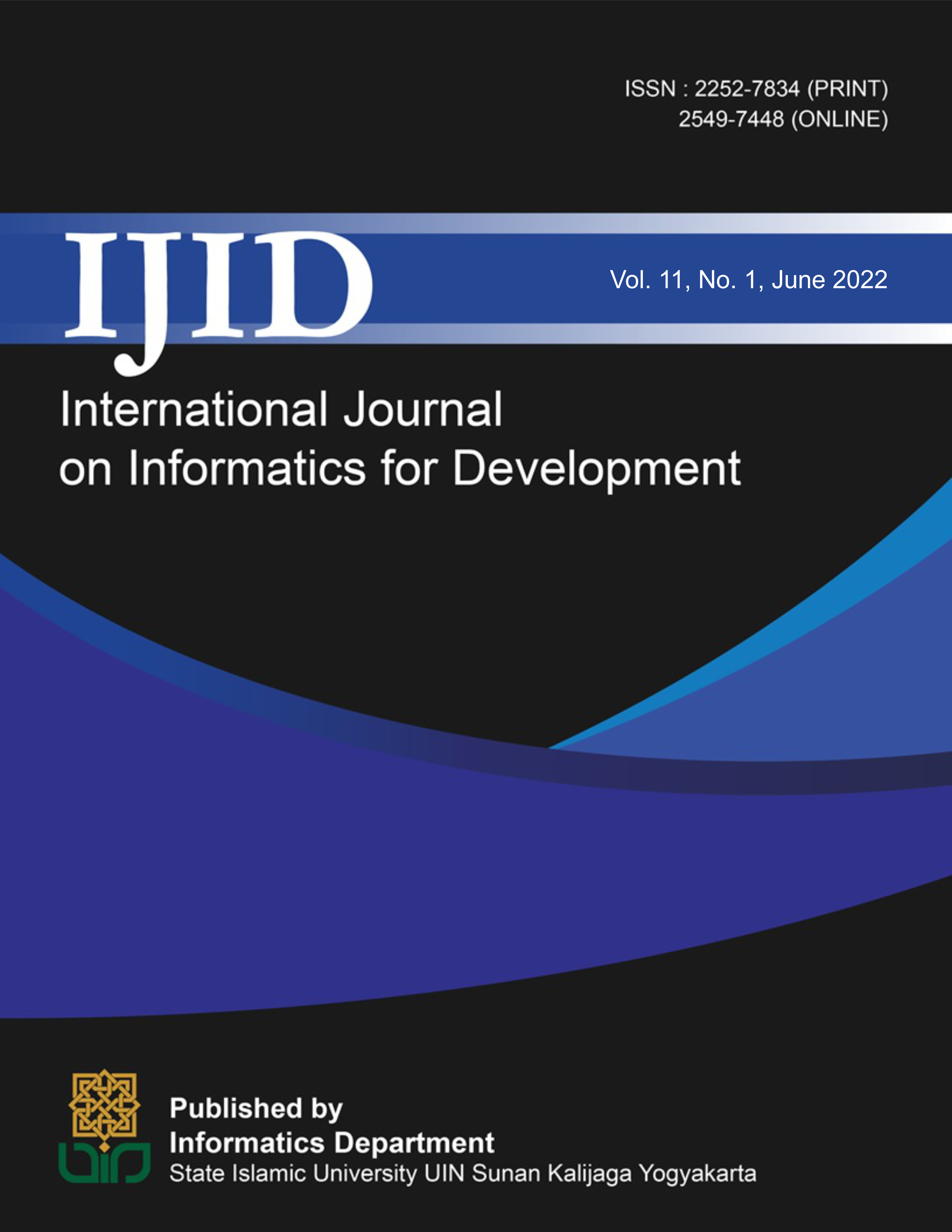Abstract
Entrepreneurship education in universities plays a significant role in creating an entrepreneurial spirit in students. We explore the application of digital entrepreneurship education contained in the Digital Library Marketing course. This research is qualitative research with a case study. Data collection was conducted through in-depth semi-structured interviews with thirteen informants. The data are photos or videos of activities during the research, and videotape recordings. The data display the output of Digital Library Marketing lectures which shows how theories following research and observation of digital media interfaces are used as promotional and marketing media. The results showed that digital entrepreneurship education applied to the Digital Library Marketing course has an important influence on students to design a professional weblog as a medium of information, to create content writing about how to fill a weblog that can sell the products offered, and to do good copywriting, also to find ideas for delivery and promotion. Besides being applied to the Digital Library Marketing course, digital entrepreneurship education is also held in digital marketing workshops to provide prospective alums. This study is helpful for entrepreneurship education literature in libraries and information that intersects with digital technology as a medium for entrepreneurship.
References
A. N. Turi, “Technologies for Modern Digital Entrepreneurship,” in Technologies for Modern Digital Entrepreneurship, 2020.
R. Baierl, J. Behrens, and A. Brem, “Digital Entrepreneurship: Interfaces Between Digital Technologies and Entrepreneurship,” FGF Stud. Small Bus. Entrep., pp. 1–22, 2019.
C. K. Volkmann and D. B. Audretsch, Introduction: The Mandate for Entrepreneurship Education. Entrepreneurship Education at Universities, International Studies in Entrepreneurship, 2017.
T. Penulis, Direktorat Jenderal Pendidikan Tinggi. Pedoman Program Mahasiswa Wirausaha (PMW) Dikti. Jakarta: Direktorat Kelembagaan, 2009.
A. Schmitz, D. Urbano, M. Guerrero, and G. A. Dandolini, Activities Related to Innovation and Entrepreneurship in the Academic Setting: A Literature Review. 2017.
E. a. Soltanifar, M, Digital Entreprneurship-Impact on Business and Society. Springer, 2021.
S. Burkhanov, R., Gagarin, A., & Novopashin, “Culture, Personality, Society in the Conditions of Digitalization: Methodology and Experience of Empirical Research,” in Human, Posthuman and Culture in the Digital. XXIV International Conference, 2022.
L. T. Kane, Straight from the Stacks: A Firsthand Guide to Careers in Library and Information Science, vol. 105, no. 7/8. United States of America: American Library Association, 2004.
E. Ortlieb and E. H. Cheek, “Adolescent Literacy: A Historical Look at What Has Worked and What is Working Today,” 2020, pp. 81–92.
J. Abdullahi, A. Barkindo, and E. A. Chioma, Entrepreneurship Education in Library and Information Science: Fostering Economic Growth and Development in Nigeria, vol. 2021. 2021.
P. Reddy, B. Sharma, and K. Chaudhary, “Digital literacy: A review of literature,” Int. J. Technoethics, vol. 11, no. 2, pp. 65–94, 2020.
L. A. Tedd and A. Large, Digital libraries: Principles and practice in a global environment. Munchen: Saur Verlag GmbH, 2005.
R. Marciniak, P. Moricz, and M. Baksa, Towards Business Services 4.0 - Digital Transformation of Business Services at a Global Technology Company, vol. 410. Switzerland: Springer, 2020.
W. Ritz, M. Wolf, and S. McQuitty, “Digital marketing adoption and success for small businesses: The application of the do-it-yourself and technology acceptance models,” J. Res. Interact. Mark., vol. 13, no. 2, pp. 179–203, 2019.
S. Diamond, “Digital Marketing All-in-One For Dummies.” Hoboken, New Jersey: John Wiley & Sons, Inc, 2019.
Digital Business Academy, “Social Media Marketing 2021-22: Beginner’S Guide Tomakingmoney Online. Become a Successful Influencer Throughyoutube, Twitter, Facebook, Instagramand Linkedinalgorithms. Start Your Passive Income,” Indep. Publ., vol. 1, p. 465, 2021.
S. Nambisan, M. Wright, and M. Feldman, “The digital transformation of innovation and entrepreneurship: Progress, challenges and key themes,” Res. Policy, vol. 48, no. 8, 2019.
E. a. Soltanifar, M, Digital Entreprneurship-Impact on Business and Society. Springer Nature Switzerland, 2021.
P. Link, “How to become a lean entrepreneur by applying lean start-up and lean canvas?,” Adv. Digit. Educ. Lifelong Learn., vol. 2, pp. 57–71, 2016.
S. Anim-Yeboah, R. Boateng, E. Awuni Kolog, A. Owusu, and I. Bedi, “Digital Entrepreneurship in Business Enterprises: A Systematic Review,” in Lecture Notes in Computer Science (including subseries Lecture Notes in Artificial Intelligence and Lecture Notes in Bioinformatics), 2020, vol. 12066 LNCS, pp. 192–203.
Cambridge, “‘Retrieved from http://dictionary.cambridge.org/ dictionary/english/ information-economy’, 2015 in Abdullahi, Jamilu; Barkindo, A; and Chioma, EA, "Entrepreneurship Education in Library and Information Science: Fostering Economic Growth and Development in,” 2015. .
N. Richter, P. Jackson, and T. Schildhauer, “Entrepreneurial behaviour and startups: The case of Germany and the USA,” Entrep. Innov. Leadersh. Prep. a Digit. Futur., pp. 1–14, 2018.
D. Mulyana, Metodologi Penelitian Kualitatif. Bandung: Rosdakarya offset, 2004.
J. Creswell, Qualitative, quantitative, and mixed methods approach. Sage Publications, 2013.
W. L. Neuman, Social Research Methods: Qualitative and Quantitative Approaches. Allyn and Bacon, 2000.
J. Musa and A. G. Tsafe, “Entrepreneurship opportunities for graduates of library and information science,” J. Libr. Serv. Technol., vol. 1, no. 2, pp. 76–82, 2019.
C. Richter, S. Kraus, A. Brem, S. Durst, and C. Giselbrecht, “Digital entrepreneurship: Innovative business models for the sharing economy,” Creat. Innov. Manag., vol. 26, no. 3, pp. 300–310, 2017.

This work is licensed under a Creative Commons Attribution-NonCommercial-NoDerivatives 4.0 International License.
